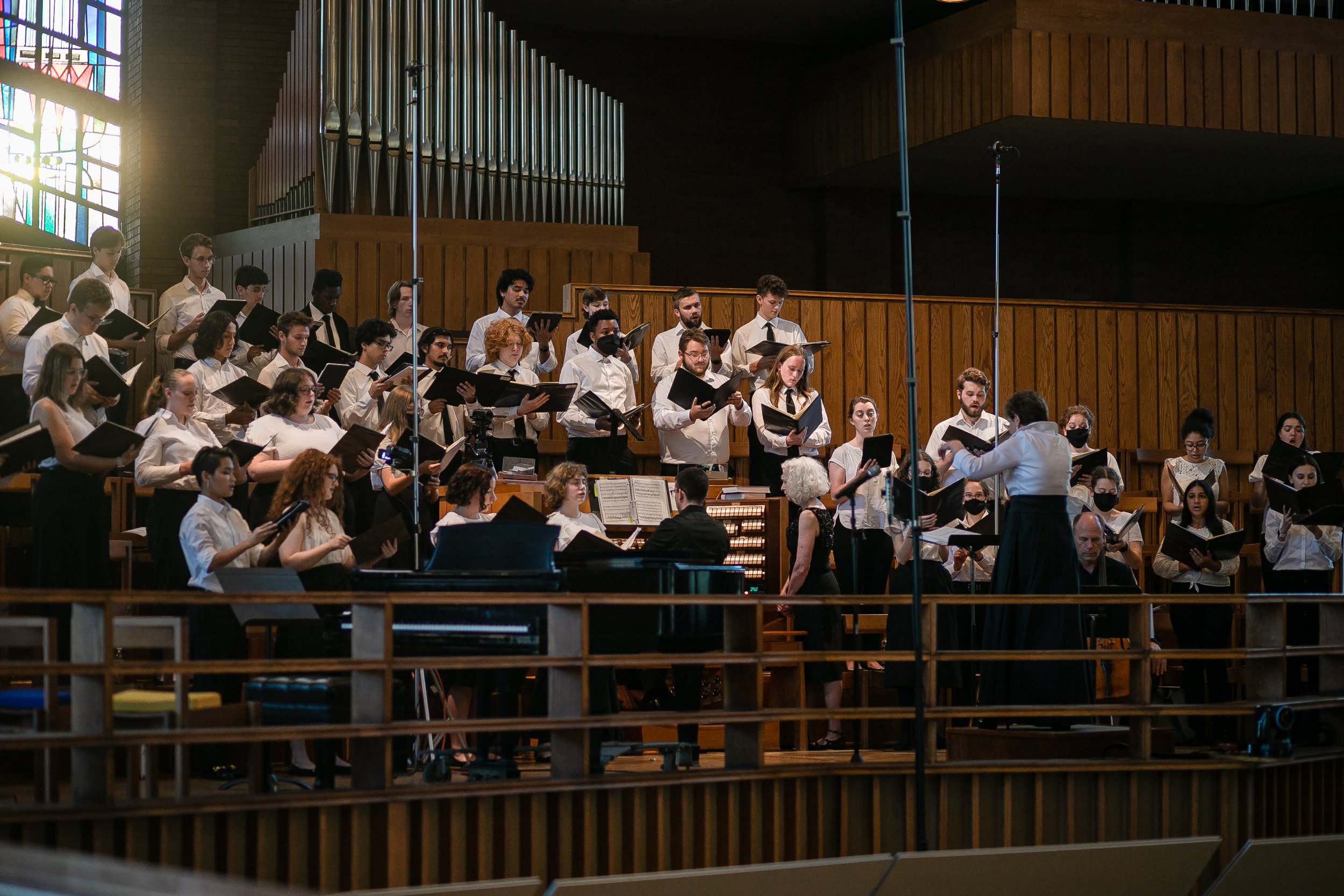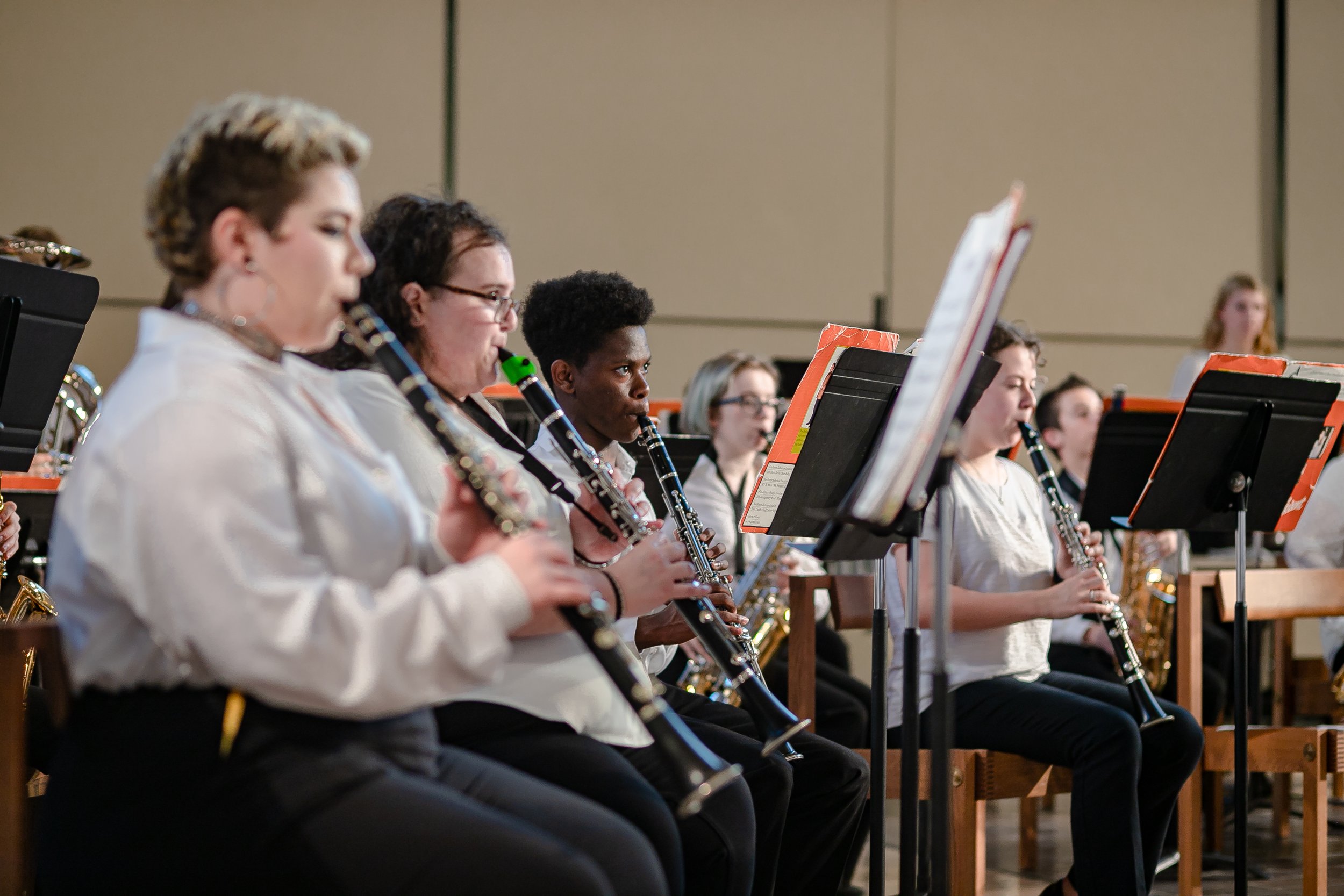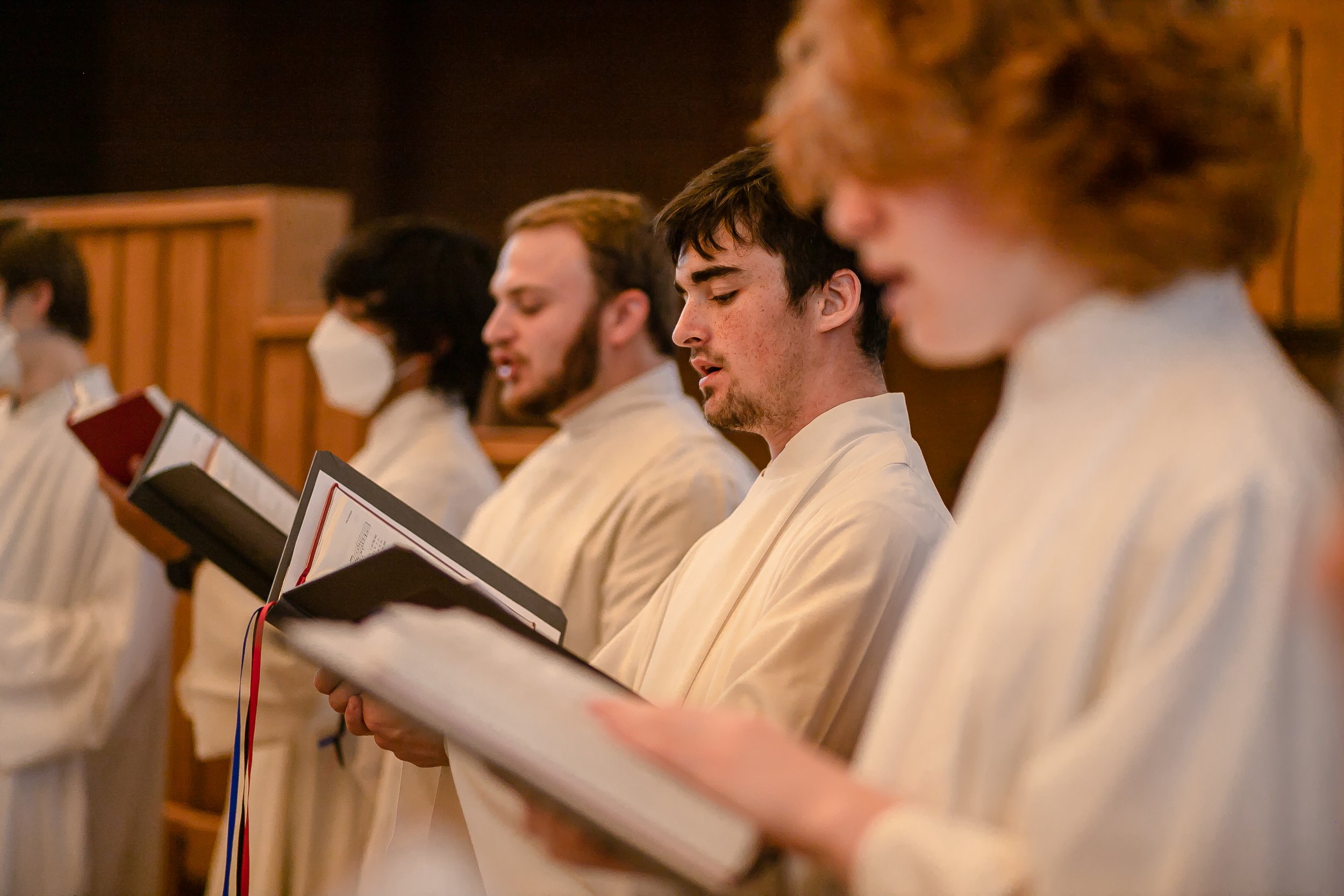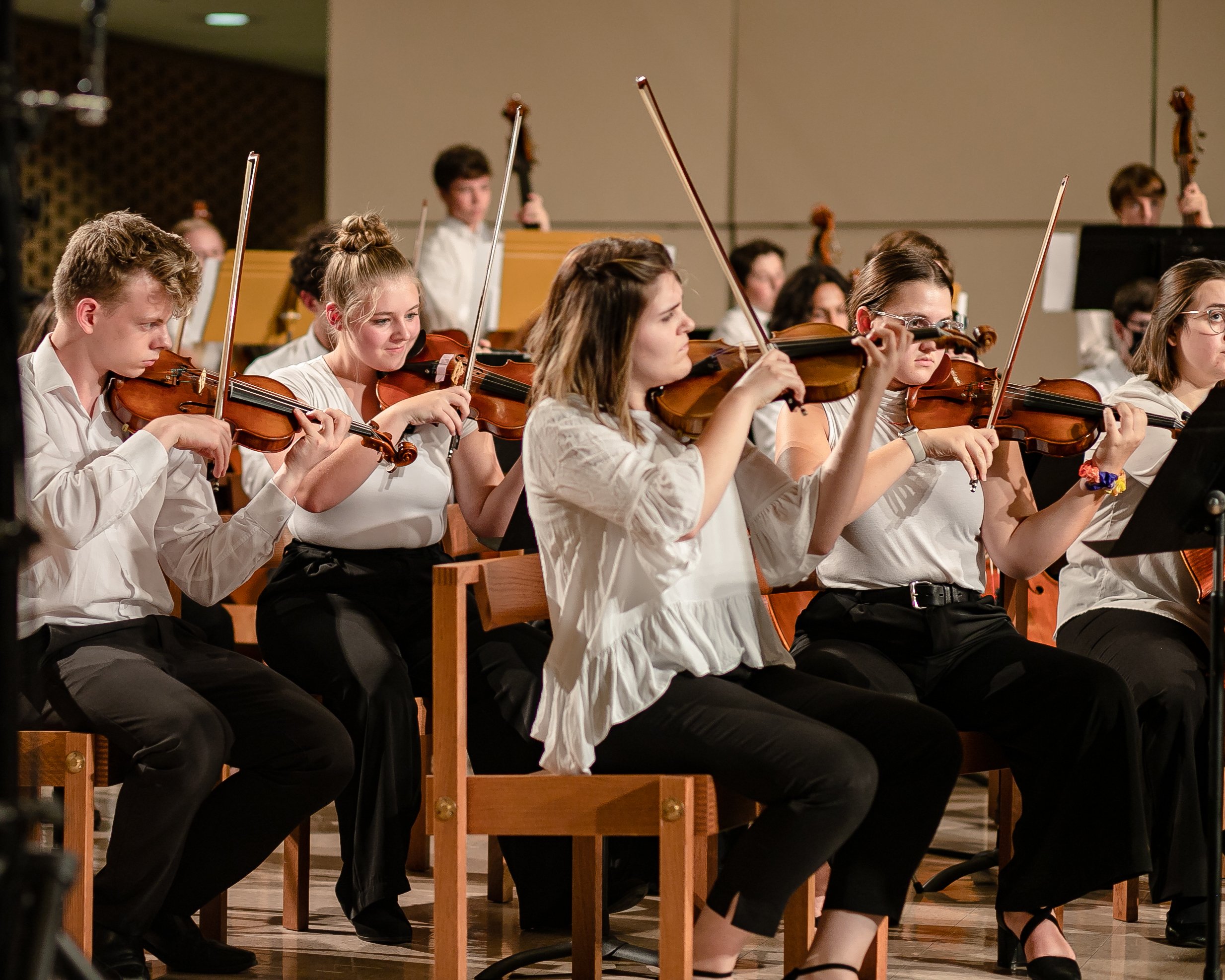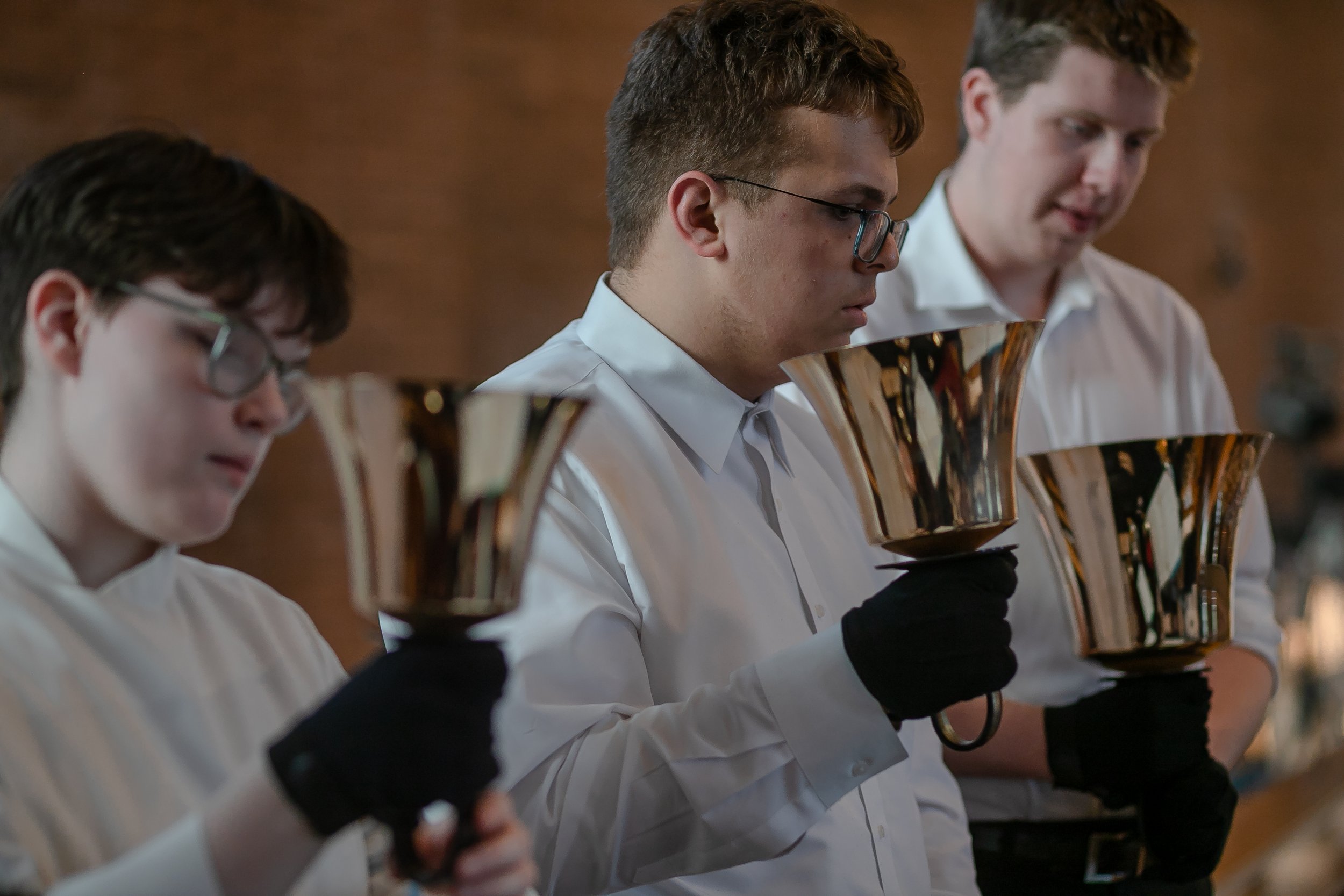Through the Song the Church Goes On
Cantor Chad Fothergill steps forward and invites the room to open the “cranberry hymnal” and turn to a page in the front. He intones the psalm and explains the pattern of responsorial singing, of matching the accent to the change in pitch. With rapt attention, over 100 high school musicians sing and follow along to the drone of a shruti box. When morning prayer and announcements have concluded, students disperse for musicianship classes and chamber music rehearsals, followed by elective classes. Hannah Koby, the ALCM-sponsored associate cantor, leads an “Intro to the Pipe Organ” elective for eager pianists looking to do more with their feet. Anne Krentz Organ meets with twenty-six students for her “Composition” elective class; today, they collectively compose a psalm refrain. In the “Church Music” elective, worship intern Joel Stoppenhagen leads the group on a hymnal scavenger hunt, then Chad and chaplain Nathan Baker-Trinity lead a discussion: how do pastors and musicians plan worship music together? How can theological ideas influence musical choices? How do hymn choices support and illustrate Scripture? How can the church musician encourage the assembly through musical enhancement and build confidence for a congregation of singers?
In the late afternoon, Hannah and organ fellow Ezechiel Daos rehearse with the Chapel Choir, while Chad and organist Karen Eddinger practice their organ duet, and Nathan and sacristan Brittany Barkus meet with the student volunteers who will be cantor, readers, and assistants at evening worship. That night, Anne and the composition class lead the psalm during Evening Prayer, singing the refrain and accompanying with hand chimes. The assembly of students, fellows, staff, and faculty open the “chocolate hymnal” to “The Day Thou Gavest” (LSB 886) and fill the chapel with four- part harmony.
This is a Tuesday at Lutheran Summer Music Academy & Festival (LSM).
For forty years, high school musicians from across the country have gathered on a Lutheran college campus to grow as musicians, live in community, and explore the depth of worship through music. Many go on to become music teachers, pastors, performers—and yes, church musicians. But for this time—those suspended four weeks in a bubble of liturgy and symphony—these students simply experience a concept of music that elevates the joy of worship and glory of God.
The primary experience at LSM is music education: becoming a stronger singer, instrumentalist, conductor, or composer through instruction from nationally recognized faculty. Students do so with private lessons, performing in chamber ensembles, taking elective classes, and playing or singing in festival ensembles: choir, band, and symphony orchestra. But this is all in the context of a connection to the church, through daily morning and evening prayer services and Sunday eucharist—over forty services in the course of a month! Over its history, LSM has evolved and grown in its offerings, and partnership with ALCM has fostered many exciting advancements and connections.
Music is our tool for building relationship and community, for articulating the story of Jesus and the church, and—more directly—for supporting the coming generation of church musicians and passing forward the musical heritage of the Lutheran church. Our mission extends to future musical lay people as well; in helping young people grow in their own musical proficiency and participation in worship, our intent is to inspire a deep love for the music of the church in all LSM students.
Deacon Ryan Hostler (LSM 1997–98), who attended the overlapping ALCM conference and the LSM 40th anniversary alumni reunion this past summer at Valparaiso University (IN), shared this comment: “Recommending students to LSM is vital for the future of the church. Whether or not these students turn out to be like myself, who went into church music because of LSM, they’re coming out of LSM with a love for music of all kinds and are being instilled to nurture the song of the church and the song we sing together.”
As a five-time alum myself (LSM 2001–2005) who now works on the LSM national staff, I have seen and felt the impact of LSM personally. Church music is in my blood—in fact, I probably had a prior critical mass (pun intended?) of familial heritage and history, with pastor and church organist grandfathers and a music professor and church musician parents. Growing up, I had no shortage of musical opportunities nor of access to and experience in both ELCA and LCMS congregations. But it wasn’t until I attended LSM that I felt a real ownership and devotion to the music of the church. Singing an Evening Prayer setting, or a four-part harmony with the words of Paul Gerhardt or Susan Palo Cherwien, felt divine. And then doing so in communion with my peers, with musical professors and professionals I admired, and with worship leaders who emulated and appealed to my own love of music? It’s powerful stuff.
In my current LSM role, I witness the immediate effect of everything LSM offers for students who attend. Remember, these are kids! Last summer, the transformation of LSM students was astonishing. I saw looks of trepidation and anxiety morph into laughter and friendship. Fear about being musically “good enough” turned into confidence and applause. I heard the tentative first notes of the Magnificat grow into strong acclamation. And after several years of COVID-19 disruption and isolation, I saw young people build a community of welcome—all informed by and sustained through the music of the church.
This is an impact that lasts. In my work to welcome new students, I reach out to and hear from so many church musicians across the country—and so many are alums with their own impassioned stories of finding their vocation at LSM, or are leaders who have welcomed students back to their home congregations to see them invigorated in worship.
Omaldo Perez, director for music and worship at Grace Lutheran Church in La Grange, IL, has recommended several students to LSM. In his words, “Every time they come back, they come with more confidence and are willing to share their gifts with the congregation. I want young people to develop their chops and not only see their gifts from the perspective of their local churches but with an expanded sense of the world in terms of their roles in worship. LSM can only make their growth and their process better and make their participation richer.”
LSM creates an intentional community of growth and belonging, surrounded by music and centered in faith. This is what so many of you work to build and support week after week in your congregations and in your worship. Through LSM and ALCM together, the music of the church is growing, evolving, and being renewed by the next generation. Through the song, the church goes on. Soli Deo gloria!
MaryLynn Mennicke is the dean and director of admissions for LSM. She graduated with a degree in music from Concordia University, St. Paul (MN), with emphasis on vocal performance and choral conducting. She previously served as the director of music at Peace Lutheran Church in Bloomington, MN. In addition to her current work with LSM, she freelances as a church musician in the Twin Cities and volunteers with Voices of Hope prison choirs at correctional facilities in Shakopee and Stillwater, MN

